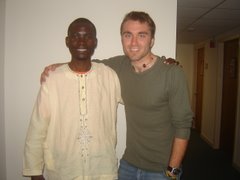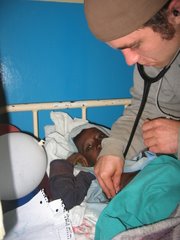Saturday 17 March, 2007 (Happy St. Patrick's Day and belated Ides of March) - 11:41 - Dar es Salaam
I would like to share with you information on a project I created and in which I have likewise been investing quite a bit of time. Simply put, the idea is to use Rwanda’s relatively new music industry to change public psyche regarding sexual behaviour and the transmission of HIV/AIDS. But before getting to logistics, allow me to briefly explain the evolution of this project.
The idea first started forming while returning from a weekend in Congo, coming through Gisenyi, RW. Two teenagers greeted me as I was walking along the Lake Kivu shore – turned about face, and walked with me back into town. It was not long into our conversation before the boys, in efforts to impress me, compared themselves to “KGB”, claiming they could rap like their heroes – even that they could rap not just like KGB, but like P Diddy, Snoop-dogg, and the others from the US. Miraculously maintaining my cool-guy status, I simultaneously informed them that being able to rap like KGB (Kigali Boyz) did not mean anything to me, because I had not ever heard of the group. My new friends proceeded to take me to a local internet café, threw in a USB memory stick and shared their favourite songs. This is amazing, I thought – these young minds are seriously influenced by the lyrics and lines of their hip-hop heroes… more so, it appeared, than of their teachers, elders or government officials.
Back in Kigali around the same time I heard a catchy radio-cut of a song in matatus heading to and from Nyamirambo (the non-mzungu Rwandese/African bumping street-neighbourhood) – and soon discovered the beautiful, rhythmic voice belonged to a lady stage-named Miss JoJo. A co-worker at the hospital heard me singing his friend’s lyrics and gave me JoJo’s mobile number. Soon thereafter, while on a short assignment from the Kigali Health Institute to Butare, Miss JoJo and I sat down for dinner and discussed some ideas that had been perculating in my mind.
All this time I had been pouring through national AIDS data in preparation for a research proposal a friend of mine and I were submitting – and the things we found were astonishing. Instinctively we wanted to design research protocols, implement programs, and change public health through scientific means – but it occurred to me that hundreds before have already tried doing this – some successfully, many others not so. While we continue to plug away on the research, we also looked for quicker intervention strategies.
My mind jumped back to the young Gisenyi boys and I realized that the common people create heroes from within their own ranks because they think they cannot relate to the power and politics of their national leaders. So all we had to do was link their heroes with the AIDS message, back the project with government support, and – voila – the minds and matters of millions of “mnyarwandans” (as they are called in Swahili) can be reached, influenced, and changed to bring about healthier living, longer life, and a more productive society.
The night before leaving Rwanda, Gilbert and I sat down for sodas with Miss JoJo and KGB, the top Rwandese female pop-musician and hip-hop group, respectively, in the country. If one or the other released a challenging song, it would be easy for someone to isolate and disregard their statement. But if these former competitors collaborated their talents and released a song together, they’d easily have the ears and minds of Rwandese, causing formerly unpersuaded people to consider what the NGOs and the government have been saying all along to the importance of ‘ABC’ (Abstain, Be faithful, and Condomize, with priorities in that order). Realizing the power they have to influence the masses, the musicians agreed to intervene.
It costs money to do all of this, though – money for studio time, and to pay a sound-engineer to harmonize the inputs, amongst other needs. Normally musicians front the money and make it back once the song is released. However according to KGB there is a law prohibiting them from making money on songs that address HIV/AIDS, so they would not be able to make the money back. Because they are professional musicians and live off their music, they cannot afford to drop 1000 USD in the studio even if it is for a good cause, so we worked a deal. I committed $500 and promised to promote the song in the US if they fronted the rest and went through with the project. They are excited, as this is potentially their big break to be known in the US, and I am excited as this is potentially an powerful intervention in the public psyche within Rwanda. They agreed to work together, run the lyrics by Gilbert to make sure it is the message we want released, and will start rehearsing soon so as not to waste expensive studio time. Within two months they’ll be ready to record. A slight problem, though, is that I took advantage of my appearance. To them, I am a white American male, probably rich, probably connected, and therefore the path to their professional dream. Taking advantage of that misconception and calculating anticipated support from people I thought might be interested in helping Stateside, I bluffed - promising the cash as if it weren't a big deal - got them started, and now have some fundraising to do before they lay down the studio-cut. If you are interested in contributing, I’ll leave information on how to make a donation at the end of the post.
Next, we wanted to get T-shirts, posters and decals with the song title, message and musicians’ names printed in the US to distribute in Rwanda. Because matatu drivers love to put stickers on their vans, making decals of their favourite musicians that simultaneously promote the song’s message is free advertising and a probable way to subliminally affect people’s psyche. Likewise, with the T-shirts – many Africans idolize western culture, particularly that from the US, and cherish clothing imported from the States. So every time they wear these shirts in town they will also promoting sexual behaviour change. We have been in communication with a graphic design artist and a t-shirt printing business in the US who seem to be interested in donating their time and resources at a discount for the project, with specifications/recommendations for the design and color scheme coming from the musicians who know what their fans will find catchy.
That wraps up what has been established so far. Now I’ll explain where this project is heading.
We are hoping to arrange a meeting between Gilbert, Miss JoJo, KGB and national leaders, particularly the head of an AIDS-awareness organization called PACFA Rwanda. We would like to get the project integrated with national support so it can be in large part owned by Rwandans themselves and not solely implemented and sustained from outside sources. If the people see national leaders working side-by-side with their heroes, they will be much more likely to seriously consider the message we are all trying to persuade them to take into account. The musicians also want to invite a world-popular American rapper named Sean Combs (stage named P Diddy) to put his voice on the project – which would add incredible support in the minds of the common people. KGB is hopeful that President Kagame will not only work with them to issue an invitation to Mr. Combs, but will also help get merchandise printed in the US shipped tax-free to Rwanda through the Embassy.
If you are interested in donating to the project, please write a check made out to my mom (Joan Huntley) with "Rwandan Music Intervention" written in the memo (my parents’ home address is: 1501 Westview Drive; Coralville, Iowa 52241; USA). She has agreed to collect the money and will wire it to Africa when we raise the amount in full. Also, if you have ideas to help facilitate the project, please feel free to email me at: benhuntley02@hotmail.com
As always, thanks for reading, and I will catch you on the flip-side.
BJFH
Subscribe to:
Post Comments (Atom)



No comments:
Post a Comment